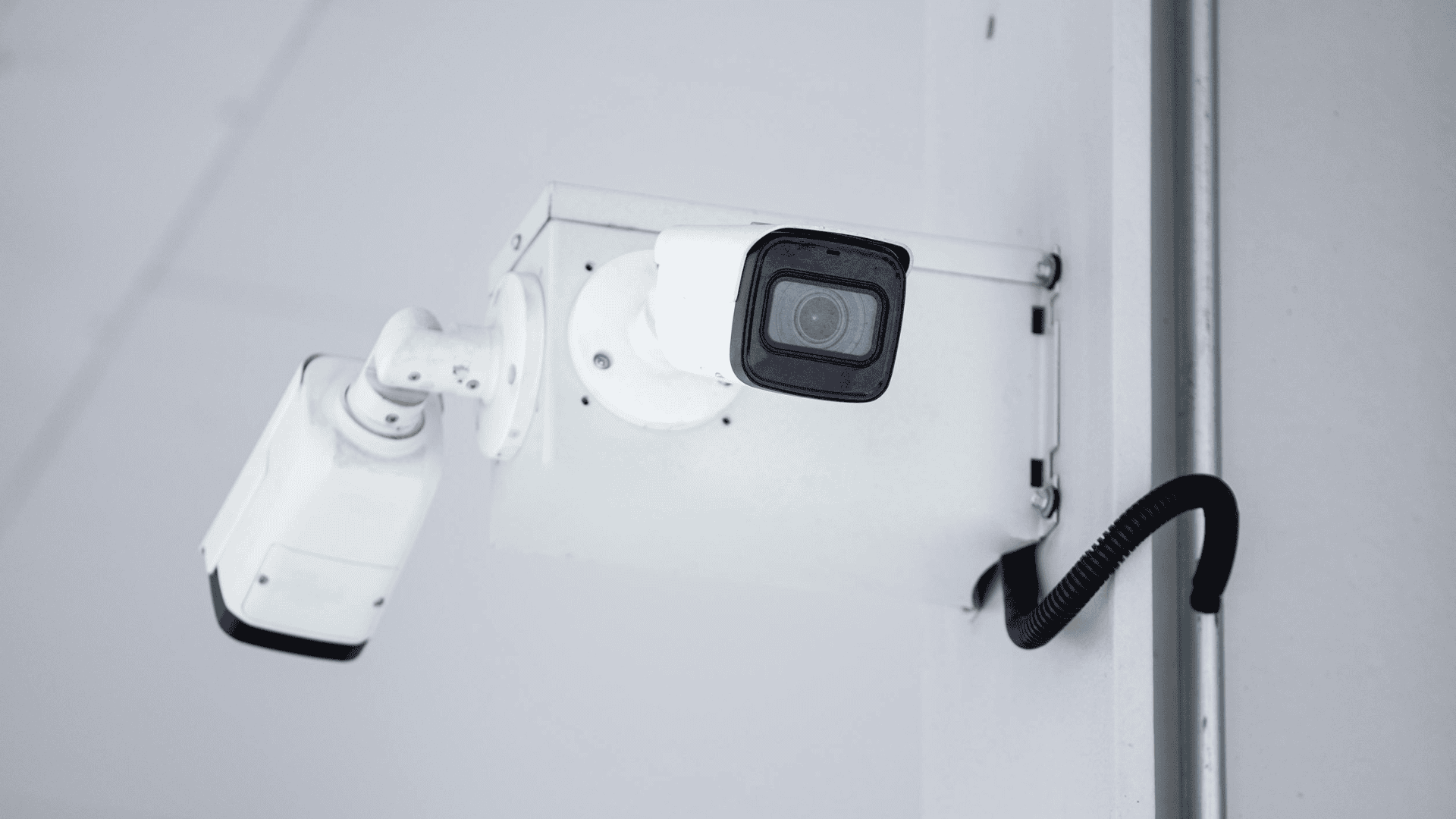In This article
Security cameras are essential components of any modern security system. They are a constant set of eyes watching customers, employees, and inventory. Choosing between analog vs. digital IP security cameras depends on many factors, but they are the two primary options for many businesses. Because analog security cameras are older technology, their images are low-resolution compared to digital IP security cameras. While IP security cameras cost more, analog security cameras may require more maintenance. IP security cameras are paired with other advanced technologies, such as remote monitoring, while analog security cameras require cabling and other analog equipment.
What Are Analog Security Cameras?
Analog security cameras are called “analog” because the captured images are transmitted in an analog format to a recording device, typically a DVR, via coaxial cables. The analog signal is converted to a digital file and stored and viewed anytime or remotely with the right software. The benefits of analog security cameras vs. digital IP security cameras make them good choices for small businesses.
Benefits of analog security cameras:
- Cost-effective: Less of an investment for smaller businesses
- Simple installation: Ready to protect a business faster and with less disruption to operations
- Lower bandwidth: Doesn’t require more costly high-bandwidth Wi-Fi service
- Easy to integrate: Compatible with older, existing analog security systems
- Well-made: durable and reliable
What Are Digital IP Security Cameras?
Digital IP security cameras capture images like analog security cameras, but IP security cameras convert and compress images to a digital format inside the camera. The remainder of the processing utilizes digital technologies, including wireless data transmission to a network router. The data can then be stored on a recorder or a server. Large businesses and those with existing innovative security systems are more likely to choose digital IP security cameras.
Benefits of digital IP security cameras:
- High-resolution: Sharper images for better identification
- Scalability: Easily work with existing business networks
- Accessibility: Images can be viewed on any device via the network.
- Remote viewing: 24/7 availability with an Internet connection
- Smart investment: Requires less support equipment
Key Differences Between Analog vs. Digital IP Security Cameras
Technology is the primary difference to consider when choosing between analog security cameras and digital IP security cameras. Although analog security cameras are much older technologies, they are still valuable and effective in many situations. Digital IP security cameras are manufactured with newer, advanced technologies for businesses with broader security needs.
Other key differences:
- Image quality: Many businesses need high-resolution images of IP security cameras, while analog security cameras may be sufficient for others.
- Investment: Larger and smaller businesses can choose from the security cameras that fit their budgets.
- Maintenance: Higher maintenance expenses may offset the lower cost of analog security cameras.
- Installation: Analog security cameras require coaxial cabling, while IP security cameras operate through a wireless network.
- Flexibility: Digital IP security cameras have more scalable features than analog digital security cameras to address specific security needs.
Advantages of Analog Security Cameras
Despite their older technologies, choosing analog security cameras vs. digital IP security cameras is wise for smaller businesses with limited investment dollars and maintenance budgets.
Other advantages:
- Easy installation: Less downtime for a business’s security system and less interference with customers’ shopping experience and employee work
- Quicker maintenance: Technicians can install parts faster and at a lower cost.
- Wider transmission range: The cable connection allows analog security cameras to transmit video signals over greater distances
- Less bandwidth required: Analog security cameras’ cable connection reserves more network bandwidth for other business needs.
- Dependability: Best for businesses with basic security needs
Advantages of Digital IP Security Cameras
Digital IP security cameras have been developed to operate seamlessly with the digital networks and other advanced technologies many businesses use today, and those they will add in the future.
Other advantages:
- Exceptional image quality: Easier to spot security incidents and respond quickly
- Flexible integration: Greater compatibility with existing security systems and networks, and scalable for specific needs
- Improved coverage: Better positioning of either wired or wireless digital IP security cameras
- Data security: Cloud storage and other secure storage devices are more protective of images and other data
- Advanced capabilities: detecting motion, tracking objects, and recognizing facial features
When to Choose Analog Security Cameras
When businesses choose between analog security cameras and digital IP security cameras, many factors must be considered: business size, security needs, employee compatibility, and costs.
Other factors:
- Budget limitations: Businesses need security, and analog security cameras are a wise, low-cost option
- Small space: Smaller businesses can be as secure as large businesses with fewer analog security cameras.
- Less business disruption: Easier installation allows businesses to operate normally.
- Perfect for upgrades: Improve the reliability of an existing analog security camera system
- Basic network: Match analog security cameras with network capabilities
When to Choose Digital IP Security Cameras
Digital IP security cameras offer the advanced technologies that larger businesses need, or those with a campus of buildings that require exterior and interior monitoring. Some buildings, such as warehouses, need higher-resolution IP security cameras because of low lighting or isolated spaces.
Other reasons:
- Inventory value: Some businesses store and sell high-value merchandise, which is better protected.
- Limited staff: Advanced remote monitoring capabilities augment employees’ monitoring of customers and inventory.
- Scalable: More options to integrate with existing security camera systems and technologies in new systems
- Increased shrinkage: Better cameras to thwart an uptick in shoplifting and fraud
- Business expansion: Investing in compatible security cameras and systems
Cost Considerations: Which System Is More Cost-Effective?
Achieving a balance between security needs and spending is challenging for businesses of any size. As shoplifting, fraud, and organized retail crime increase, businesses require adequate security cameras and systems without breaking the bank. As a business grows, hires more employees, and becomes more vulnerable, investing in a more robust and comprehensive security camera system is the right choice.
Other cost-effectiveness factors:
- Upfront cost savings: Analog security cameras cost less.
- Business interruption: Analog security cameras are easier to install and integrate with an existing system.
- Better ROI: Equipment longevity benefits businesses that need digital IP security cameras.
- Costly employee monitoring: Advanced features, cloud storage, and remote accessibility allow employees to allocate more time to customer service
- Total security: IP security cameras can be integrated with other security applications, such as employee/supplier access and alarms.
Conclusion: Choosing the Right Security Camera for Your Needs
Understanding the key differences between analog security cameras vs. digital IP security cameras will allow any business owner to make the right choice. Analog security cameras are the choice for a budget-conscious business because they and their installation cost less. Digital IP security cameras can be easier to install because they don’t require cabling and include advanced technologies and features that larger businesses need.
Thorough assessment of a business’s budget, scalability capabilities, and security requirements is critical to making the right choice.
- Smaller businesses with fewer customers and employees will achieve sufficient security with analog security cameras.
- As smaller businesses grow, a new assessment will identify additional locations for either analog or digital IP security cameras and an upgrade of accompanying monitoring equipment, storage, and other features.
- Businesses with a large retail, warehouse, or campus footprint will likely need digital IP security cameras for better views of more space, employees, deliveries, inventories, and transactions.
- Regardless of size, digital IP security cameras and a complementary security system better serve businesses offering high-value merchandise like jewelry and electronics.
Want to learn more about DTiQ’s 360iQ platform and its integration capabilities? Why not contact us and speak with one of our experts to learn more?





























